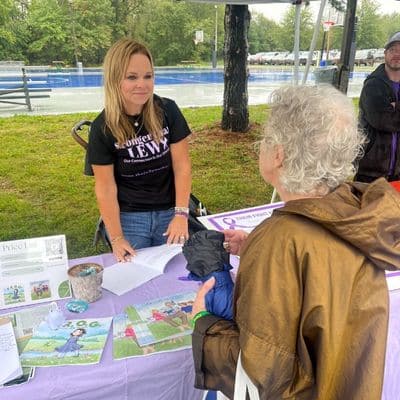Let’s Talk About Lewy
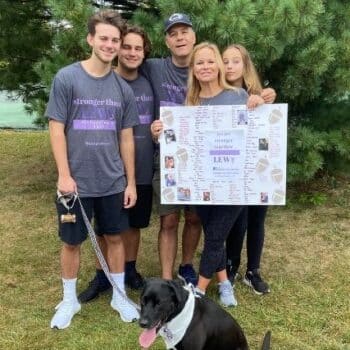
It reminded us that even on the darkest days, there are blessings to be found — small, sacred moments of grace, connection and love.
May 16, 2025
Jennifer Randazzo realized the importance of intergenerational connection when her father was diagnosed with Lewy Body Dementia in 2003. Witnessing its impact on her children, who were very young at the time, was heart-wrenching. They observed the physical and mental decline of their grandfather, struggling to comprehend the changes unfolding before their eyes. As a member of the “sandwich generation,” Randazzo became painfully aware of the difficulty of helping an ailing parent while raising young children. ‘Our connection is our strength’ became her motto and the driving force behind her mission to inspire connection, conversation, and compassion. Through her personal experience, healing journey, and heartfelt advocacy, Randazzo engages with caregivers to raise awareness, offer guidance, and empower them to confidently support their aging parents with grace, compassion and confidence.
According to the Lewy Body Dementia Resource Center, as many as 1.4 million people live with Lewy body dementia in the United States alone. It is the second most common form of dementia (behind Alzheimer’s disease) and, in my opinion, the most devastating. Yet most people have still never heard of it. I hope to not only raise awareness about LBD, but help people know they’re not alone.
My dad was 55 years old when he was diagnosed. We had no idea what lay ahead for him and no resources to help us figure it out. We felt very alone. Alone in our ability to understand what was going on with my dad. Alone in our journey to advocate for his care. Isolated by the lack of support from others who could relate to what we were dealing with. There was no LBD community for us to lean on. It was, and still is, a very isolating disease.
How we got here
At the time of my dad’s diagnosis, my oldest was four years old and my middle son was a few months old. My dad’s employer told my mom that he couldn’t come back to work until he was cleared by a doctor. They were seeing some signs that he was struggling to remember things at the job that he’d had for over 30 years. He worked at an industrial gas plant, so there wasn’t room for error. My dad was 51 at the time. My mom wasn’t clueless by any means. She had noticed some changes, but it was easy to explain them away because dad was able to masterfully cover and deflect. Now that his employer was seeing a deficit in his ability to do his job, there was no denying it. We were dealing with something bigger than typical forgetfulness. Mom made it her mission to figure it out.
Eventually, we were told that dad had both Alzheimer’s and Parkinson’s. How unlucky was he to get two diseases that affected two different but major functions of the brain: cognitive and movement? We couldn’t believe it. How could one person be that unlucky? My mom was a pediatric nurse for many years so she was a consummate caregiver and advocate for my dad. Eventually, she had turned over enough stones and found a specialist at University of Virginia who diagnosed my dad with LBD, a type of dementia that often underlies Parkinson’s—and that is very often misdiagnosed.
My first thought when I heard the diagnosis was, “Lewy WHO?” None of us had ever heard of this disease, and at that time (before social media and WebMD) it felt like no one else had, either. We continued to tell people that he had Alzheimer’s and Parkinson’s, because that was easier to explain.
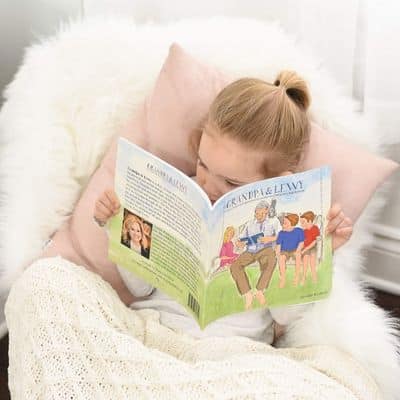
Trapped
My dad fought the disease for over 12 years. Some days were easier than others, but every day was a battle between mind and body. For him, it was being trapped between two realities: one where his mind was slipping away, and the other where his body was failing him.
One doctor explained it was as if his brain was constantly fighting for control over cognitive and physical functions. When the Parkinson’s symptoms were prominent, Dad’s mind was clear — he was sharp, present, and himself — but his body was rigid, his movements slow and strained.
Other times, when the cognitive symptoms took over, confusion, hallucinations, and memory loss would cloud his mind, leaving only brief glimpses of the man we knew, yet his body would move with a surprising ease and strength. It was a cruel and unpredictable dance between clarity and chaos, strength, and surrender.
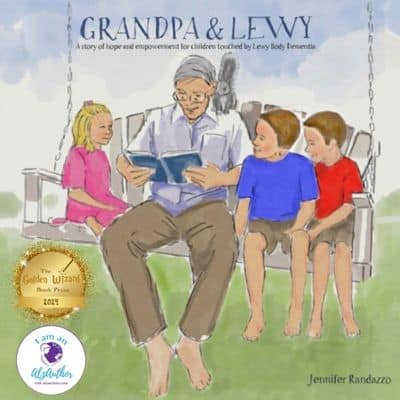
Finding purpose
And after the heartbreak, the grief, and the long goodbye comes healing. Not all at once, but little by little. In the quiet. In the remembering. In the honoring.
That healing led me here — finding my purpose, honoring my dad, and learning to walk in truth. Our truth. A truth shaped by love, loss, and the unwavering belief that no one should walk this journey alone.
Writing Grandpa & Lewy: A Story of Hope and Empowerment for Children Touched by Lewy Body Dementia began as a passion project — a way to honor my dad and help my children understand something that even we, as adults, struggled to comprehend. The story follows a young boy who shares a special bond with his grandpa. As his grandfather begins to behave differently due to Lewy body dementia, the boy learns that while things can be challenging, love and understanding can make a difference.
As I wrote this, I couldn’t stop thinking about all the other families who could find hope in our story. I saw a need for a resource we never had — a touching tale that serves as a valuable tool for families navigating the challenges of Lewy body dementia, promoting understanding and empathy.
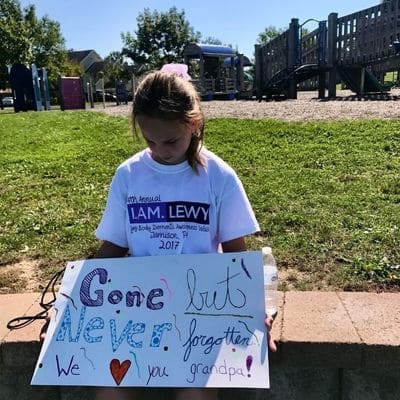
Loving through Lewy
When I think of our journey, I call it “Loving through Lewy,” because while LBD may change the person you know, it can’t change the love you have for them.
Loving through Lewy means choosing love — through the confusion, the decline, the changes you never saw coming.
I wish I could tell you our journey was easy or even good. The cruel truth is, there’s nothing good about LBD. But that doesn’t mean there wasn’t good in the experience.
LBD taught us what we were capable of as a family. It revealed our strength, our resilience, and how we could come together when everything felt like it was falling apart. It taught us how to laugh in the most tragic moments and to cling to faith even when things felt hopeless. And most of all, it reminded us that even on the darkest days, there are blessings to be found — small, sacred moments of grace, connection and love.
